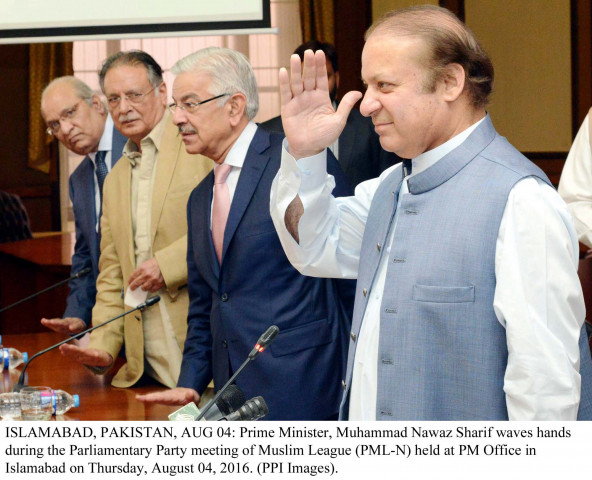Centre wants cut in provincial slice of revenue pie
Additional funds needed for Operation Zarb-e-Azb, creation of security force for CPEC

Additional funds needed for Operation Zarb-e-Azb, creation of security force for CPEC PHOTO: PPI
The finance ministry has called for creating a ‘national security fund’ with 3% contributions from each of the four federating units from the annual divisible pool, Finance Minister Ishaq Dar told a news conference after the second meeting of the 9th NFC award.
Govt considering downward revision of property valuations
As the Centre and the four provinces manoeuvred to position themselves, all of them asked for the moon but none would be catching even a glimpse, an official involved in the NFC negotiations told The Express Tribune. The provinces sought an increase in their respective shares, while the Centre searched for ways to recoup the funds already given under the previous award.
Under the 7th NFC award, there were constitutional guarantees according to which the share of provincial revenues could not be reduced, but there were ways to help the federation meet its need for additional finances, Dar said.
He said the ongoing Operation Zarb-e-Azb, rehabilitation of internally displaced persons (IDPs) and the creation of a security force for the China-Pakistan Economic Corridor (CPEC) required more resources. “These requirements can be met from the proposed National Security Fund.”
He said a decision in this regard required a consensus of all provinces.
The second meeting for the NFC award took place after a gap of 20 months, because of the government’s lethargy to tackle this sensitive issue despite the fact that the previous NFC award had expired in June last year.

Only five of nine members attended Monday’s meeting. Except for Punjab Finance Minister Dr Aisha Ghaus Pasha, all provincial finance ministers were absent from the meeting. Technical members represented the other three provinces.
Dar avoided giving a detailed reply when asked if the commission would devise a new resource distribution formula between the Centre and the provinces (vertical distribution) and among the provinces (horizontal distribution).
Provinces dilly-dallying over deployment of CPEC force
Currently, the Centre gets 42.5% of the divisible pool and the provinces receive the rest.
Of the total share of the provinces, 82% is distributed on the basis of population, 10.3% on the incidence of poverty or backwardness, 5% on revenue collection and 2.7% based on inverse population density.
Under the 7th NFC award announced in 2010, the share of the provinces had been jacked up to 57.5% of the total divisible pool. On Monday, the provinces called for increasing their overall share, enabling them to meet additional expenditures on programmes that would be devolved to the provinces and sustainable development goals.
Khyber-Pakhtunkhwa’s technical member Prof Muhammad Ibrahim Khan said assigning a weightage of 82% to population was too high and it should be brought down to 60%. He also called for increasing K-P’s share from one per cent to five per cent to offset the losses caused by war on terrorism.
Prof Ibrahim said that after the 18th constitutional amendment, the Centre’s responsibilities had decreased, necessitating transfer of more funds to the provinces.
Govt may set up 'new' company to borrow Rs200b
Balohcistan’s technical member Dr Kaiser Bengali said both the Centre and the provinces were walking a tightrope and there was little space to accommodate fresh demands.
Sindh’s technical member Senator Saleem Mandviwalla called for imposing a 5% federal excise duty on crude oil, saying that the Centre should allow the provinces to collect taxes such as GST on goods because of better performance of provincial revenue authorities.
Mandviwalla expressed the hope that the next fiscal year’s budget would be finalised on the basis of the new NFC award. “If the requirement of a national security fund is genuine, then the provinces might agree to it,” he added.
The commission received presentations from the four working groups constituted to deliberate upon specific areas and prepare recommendations for the award.
Punjab presented a report on ‘resource mobilisation at the federal and provincial level’; Sindh shared findings of the working group on ‘devolved versus integrated tax structure-evaluation of tax collection framework in Pakistan; K-P gave a presentation on ‘allocation efficiency and expenditure analysis at the provincial and federal level’ and the federal government briefed the meeting on Rationalisation of subsidies and grants.
Dar said all working groups would update their studies by early next month and the commission would meet again in the third week of December.
Published in The Express Tribune, November 29th, 2016.



1724319076-0/Untitled-design-(5)1724319076-0-208x130.webp)















COMMENTS
Comments are moderated and generally will be posted if they are on-topic and not abusive.
For more information, please see our Comments FAQ